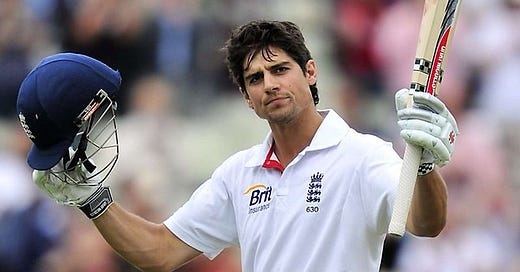There was a touch of Clement Attlee about Alastair Cook, the record-breaker who has finally put down his bat.
‘Few thought he was even a starter.
There were many who thought themselves smarter.
Yet he ended PM,
CH and OM,
An Earl and a Knight of the Garter’.
It’s the modest man paying tribute to his accomplishments, and as it’s a witty verse we forgive him. Cook doesn’t go in for that kind of mullarkey, being even more modest than the Labour Prime Minister. For the figures tell his tale of conquest very well.
Between February 2006 and August 2018 Cook opened the batting for England in 161 Tests, and was never dropped. He led the XI in 59 of those matches, and made 12,472 runs at an average of 45. He introduced himself with an unbeaten century on debut in Nagpur, and took his leave with another century, also against India, at the Oval.
No left-handed batsman has scored more runs in Test cricket. That feat doesn’t elevate him above Garfield Sobers, Neil Harvey or Kumar Sangakkara, but it is a cricketer’s equivalent of the CH. It places Cook among the ranks of the most distinguished. ‘When you are old and grey and full of sleep, and nodding by the fire…’
Not that Cook is one to read his own notices. Having left Test cricket he went back to Essex as senior officer, and promptly batted them to championship triumph in 2019. Like his mentor, Graham Gooch, he was linked umbilically to the county. What must they think of Dan Lawrence, who believes he must exchange Chelmsford for the Oval’s broad acres if he is to fulfil his talent?
There are times in a life when you get it right. When Cook appeared in the Test team, eight months after Kevin Pietersen had declared his mighty talent by making a century which enabled England to reclaim the Ashes, I wrote that the Essex man would score more runs for England in Tests.
Friends said it was a wild punt. But the race doesn’t always go to the one who sets off with a train to catch. Pietersen had thrilling qualities, that much was clear. I suspected that Cook’s steadfastness would, over the years, bring a greater yield. As they say, or used to, he had ‘bottom’.
It’s a very English story, for Cook is a very English chap. He was a boy chorister at St Paul’s Cathedral School, and a gifted musician at Bedford School, where he broke every batting record. He did well at exams, too, but there was never a touch of ‘skillso, fans’ which put so many people off Pietersen. The English never take to brash folk, and in any case Pietersen isn’t English. He never belonged, and never wanted to.
Where does Cook belong, in the galere of English cricket? Of opening batsmen since Hutton and Washbrook, he makes a good fit with Gooch. Right and left, and sound men of Essex.
Some would make a case for Geoffrey Boycott, a superb defensive batsman at his best in Australia in 1970/1, when his best was very good indeed. But Boycott was a selfish man who never understood the importance of team spirit. ‘You can count your friends on the fingers of a hand’, Brian Close told him. Of all the rebukes Boycott has endured in a life of abject solipsism that must be the most cutting.
Cook always enjoyed the loyalty of those who played with and under him, for he is a manifestly decent man, who put the team’s needs before his own interests, though usually they coincided. When the crossing got rough he stood on the bridge, defying the weather to do its worst. He never walked away, or blamed others. There was no trace of self-pity.
He had five strokes, they say. That’s true. He defended good balls, and cut, pulled and whipped those that offered runs. He did it again and again, and never really looked ‘in’. Yet he was never dull, because he revealed his character in every innings, and that character showed him to be one of life’s Horatios, never disturbed by misfortune. There was always another innings.
The gifted do not always make champions. Going back a generation England gave chances to Matthew Maynard, Neil Fairbrother, John Morris and Rob Bailey. All were superb strokeplayers, who dazzled in county cricket. Not one made a century in Tests. Neither did Martyn Moxon, a fine opening batsman, who looked every inch an international cricketer.
Years later Graeme Hick, Mark Ramprakash and John Crawley had their moments, though they were less frequent than their admirers hoped. The race isn’t always to the swift. In cricket, where every ball may be your last, other qualities are important. Often they are the most important qualities of all.
Look at the difficulty of replacing Cook. Some decent players have had a go. Some have done well for a while. But none has made an unanswerable case. Does anybody really think that Ben Duckett, today’s opener of choice, is a bona fide Test batsman?
The game changed so much during Cook’s two decades at the crease. Modern players have been brought up in a game that favours the one-day basher, and Cook never mastered that tongue. He is the last of a line. ‘Look at Cook’, people will say in future, as though they were pointing to a brontosaurus. Well, they too had their time.
He served the game most nobly. And nobody can ever take away those runs.




Very good Michael; and whilst one must agree with you re Boycott, on cricketing grounds, his support for the Bairstow family after the awful suicide of Johnny's father David shows him, behind his steely Yorkie exterior, a good and true human being.
Cook? A phenomenon.